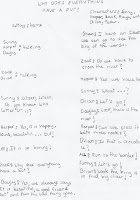 What children can get from the drama and role-play activities goes beyond the speaking and listening because drama techniques are also a great way to help them improve their reading and writing skills.
What children can get from the drama and role-play activities goes beyond the speaking and listening because drama techniques are also a great way to help them improve their reading and writing skills. Very motivating writing activities (previous to the performance, which to the students is the ultimate goal,they just love it!) are:
- Writing short dialogues individually
- Writing scripts in small groups
- Writing songs and poems
- Writing a story in order to later develop a script
These images are examples of scripts my spanish Year 4 students have written. I was working on question formulation (which they find very hard) and proposed the following activity:
1. They got into groups of 4/5 and thought of a question they would like an answer t
 o
o2. They developed a story around, and trying to answer, that question.
3. They wrote the script. They had to include at least 8 more questions in the dialogues.
4. They assigned the characters and rehearsed the play.
5. They performed the play.
 If you are interested in knowing more about the effectiveness of this teaching strategy,
If you are interested in knowing more about the effectiveness of this teaching strategy, 




